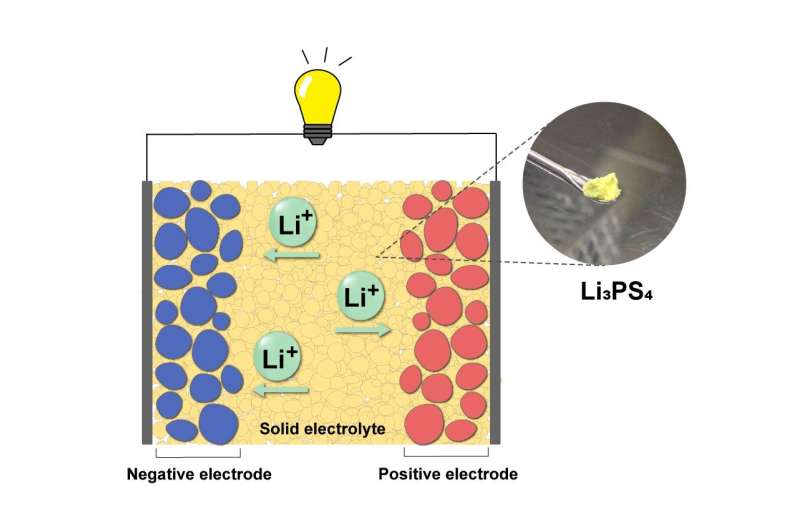This article has been reviewed according to Science X's editorial process and policies. Editors have highlighted the following attributes while ensuring the content's credibility:
fact-checked
peer-reviewed publication
trusted source
proofread
Breakthrough in stabilization of solid electrolyte paves way to all-solid-state batteries

Osaka Metropolitan University scientists have achieved an unprecedented stabilization of the high-temperature phase of Li3PS4—a critical material for all-solid-state batteries—thus attaining exceptional ionic conductivity even at room temperature. This breakthrough brings us one step closer to the realization of all-solid-state batteries and the adoption of this technology in a broad range of applications, including electric vehicles. The results were published in the Journal of the American Chemical Society.
All-solid-state batteries are expected to be put to practical use as next-generation energy storage devices that integrate high levels of safety and enhanced energy density, thereby realizing a sustainable society. All-solid-state lithium batteries operate by facilitating the movement of lithium ions through a solid electrolyte. However, since ions cannot move freely within solids, the development of solid electrolytes with high ion conductivity that, like liquid electrolytes, enable the rapid movement of lithium ions, is imperative.
A research group led by Professor Akitoshi Hayashi and Associate Professor Atsushi Sakuda of the Graduate School of Engineering at Osaka Metropolitan University succeeded in stabilizing, for the first time, the high-temperature phase of Li3PS4 (α-Li3PS4), which exhibits high ion conductivity, at room temperature via rapid heating to crystallize Li3PS4 at 400 °C min−1. Since Li3PS4 is a promising solid electrolyte, this achievement makes possible the development of materials for all-solid-state batteries with higher performance.
Professor Hayashi explained, "Li3PS4 showcases varied crystal structures depending on temperature variations. The high-temperature phase is generally recognized for its superior ionic conductivity; however, the challenge has been to stabilize this phase at room temperature. We finally accomplished it by focusing on the heating rate during crystallization. This is the culmination of nearly 20 years dedicated to the development of all-solid-state battery materials."
More information: Takuya Kimura et al, Stabilizing High-Temperature α-Li3PS4 by Rapidly Heating the Glass, Journal of the American Chemical Society (2023). DOI: 10.1021/jacs.3c03827
Journal information: Journal of the American Chemical Society
Provided by Osaka Metropolitan University





















